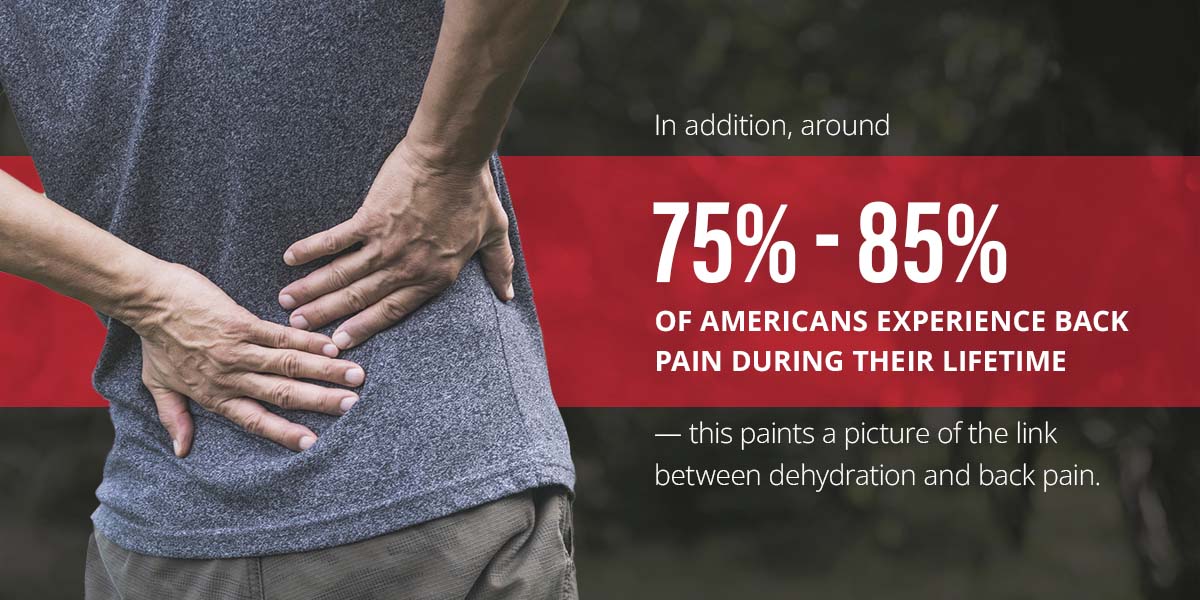We often hear how important it is to drink enough water. Dehydration causes many health issues, including headaches, dizziness and muscle cramps. It may surprise you that dehydration also causes back pain. The fluid in our spinal discs acts as shock absorbers for the spine. When the discs lose water, they lose lubrication and protection. The spine bears the brunt of movement, leading to pressure and discomfort.
Understanding the problem is the first step in solving it. Learn more about why you get back pain from dehydration and how to prevent it below.
Can Dehydration Cause Back Pain?
The simple answer is yes. Considering that water makes up 60% of the human body, it’s easy to see why a lack of hydration may cause health issues.
We know drinking water is good for us, yet 75% of Americans suffer from chronic dehydration. In addition, around 75% to 85% of Americans experience back pain during their lifetime — this paints a picture of the link between dehydration and back pain.
Spinal Health and Hydration
The spine is the control center for movement, helping us stand upright, walk, bend, dance and run. It protects the spinal cord’s nerves connecting to our brain, allowing us to control how we move. Spine health is instrumental to the functioning of our organs. We must take care of our spines to live an active life.
To understand dehydration-related back pain, you can familiarize yourself with the spine’s structure:
- Vertebrae: The spine contains 24 bones stacked to form the spinal column. Vertebrae protect the spinal cord.
- Intervertebral discs: Gel-like pillows rest between the vertebrae, acting as shock absorbers. The discs prevent friction and wear from the bones rubbing together.
- Nucleus pulposus: The high water content in the nucleus pulposus gives discs their shock-absorbance. Think of the nucleus as a cushion filled with jelly. It protects the spinal column and prevents vertebrae from grinding together.
- Annulus fibrosus: A stiff outer ring surrounds and protects the nucleus pulposus.
- Ligaments: Groups of ligaments connect the bones of the vertebrae. Ligaments fasten bones to bones.
- Tendons: This connective tissue joins muscles to vertebrae. Tendons link muscle to bone.
- Facet joints: These joints give the spinal column flexibility and mobility.
The vertebrae and discs lose fluid during the day through movement. When at rest, your body replenishes this lubricating fluid. However, if you’re dehydrated, it prevents the restocking of vital liquids. Water is the primary substance that gives the nucleus pulposus its cushion-like qualities. Without enough hydration, the “cushions” deflate, reducing lubrication and support of the spine.
When dehydration occurs, the discs may condense and collapse. Less cushioning between the vertebrae leads to pressure on the spinal nerves, resulting in back pain. The discs may swell when dehydrated, increasing the risk of herniated discs. A herniated disc can lead to pinching of the sciatic nerve, known as sciatica. Dehydration can cause a sore back, but you may also experience pain in your neck and legs.
The body sends hydration to the areas that need it most. Organs like the heart and lungs receive water before the spine. Drinking enough water is crucial to ensure every body part has adequate hydration to function.
Signs of Dehydration
You understand the importance of hydration for spinal health, but how do you know if you’re dehydrated? Here are some of the symptoms to look out for:
- Dry mouth: A cough may accompany dry tongue and lips if you’re not consuming enough water.
- Dark-colored urine: When hydrated, your urine is pale or clear. Bright yellow or dark-colored urine is a telltale sign you need to drink more.
- Constipation: Less frequent bowel movements can indicate dehydration.
- Flushed skin: Red or blotchy skin may suggest inadequate water intake.
- Fatigue: Feeling tired or listless despite getting enough sleep can also be a sign of poor hydration.
- Cramping muscles: Little water consumption can cause painful muscle contractions or tightening.
- Appetite loss: Dehydration can cause your appetite to decrease, and you may crave sugar more than usual.
- Loss of flexibility: Without adequate water, vertebrae don’t have the necessary lubrication, reducing mobility and flexibility.
- Dizziness or lightheadedness: Poor hydration can directly impact your brain’s functioning and may cause confusion or disorientation.
- Headaches: Symptoms of dehydration-related headaches include nausea, vomiting and dizziness.
- Sunken eyes: Lack of proper water intake can cause a reduction in the skin’s plumpness, sometimes noticeable in the thinner skin around the eyes.
- Low blood pressure and a high heart rate: Dehydration can lead to a drop in blood pressure and an increase in your heart rate.
If you experience any of these symptoms, there’s a chance that you’re dehydrated. Even if you’re unsure, drinking water can only help.
Signs of Dehydrated Discs
Disc desiccation is the dehydration of the intervertebral discs. When discs lose fluid, the nucleus pulposus becomes brittle and flat. Over time, the pressure on the discs causes them to degenerate. Symptoms of disc desiccation include stiffness, weakness, tingling or pain in the back. It may also affect the nerves. Be aware of these clues that could indicate dehydrated discs:
- A stiff back accompanied by pain, weakness or tingling
- Radial pain or numbness down the legs
- Changes in bladder or bowel movements
- Loss of reflex control in legs
Many issues cause back pain, including chronic dehydration. If you often experience back pain, schedule an appointment with a chiropractor. They can assess if dehydration is causing back pain or if there is another cause. Identifying the underlying cause is the best way to treat it. When you have a toothache, you visit a dentist. If your stomach hurts, you go to a doctor. Think of back pain in the same way. Early detection can solve back problems before they become more serious. A chiropractor is a qualified doctor able to treat pain, prescribe medication and offer advice on lifestyle changes to help you find relief.
Tips to Avoid Back Pain From Dehydration
Drinking too little fluids or losing electrolytes through sweating or illness causes dehydration. Staying hydrated is important in any season, though you may need to drink more during hotter months. Medical conditions and certain medications also contribute to dehydration. Hydration is a delicate balance of replacing the fluids lost throughout the day. Drinking water can help back pain, but you must also replenish electrolytes. Potassium, sodium and magnesium help retain water and aid muscle movement.
Follow these tips to stay hydrated:
- Drink the recommended amount of water each day — around 3 liters for men and 2 liters for women.
- Add electrolytes to your water, in particular when exercising or working outside.
- Check your urine! Drink more water if it appears darker rather than clear or pale.
- Increase your water consumption during exercise.
- Eat water-dense foods such as raw fruits and vegetables. Examples of hydrating foods include cucumber, celery, spinach, watermelon, cantaloupe and oranges.
- Carry water with you in a reusable bottle to make it easier to stay hydrated on the go.
- If you prefer zestier flavors, add lemon, lime or fresh fruit to your water to encourage you to drink it! Adding a pinch of salt helps with electrolytes.
- You can download an app to track your water intake or use your bottle to calculate your drinking amount.
Contact Thrive Chiropractic Group to Treat Your Back Pain
Staying hydrated is vital for your physical and spinal health. If you suffer from back pain, a chiropractor can help restore your quality of life. The benefits of chiropractic care include more than pain relief and management. You can expect increased mobility, better sleep quality, eased headaches and enhanced joint health.
At Thrive Chiropractic Group, we’re passionate about improving the lives of our patients. With offices across Oklahoma, we’re here to help you live a pain-free life. We work with major insurance providers to offer affordable services and quality care. Let us help you thrive!
Contact us to schedule an appointment or learn more about our services today!



